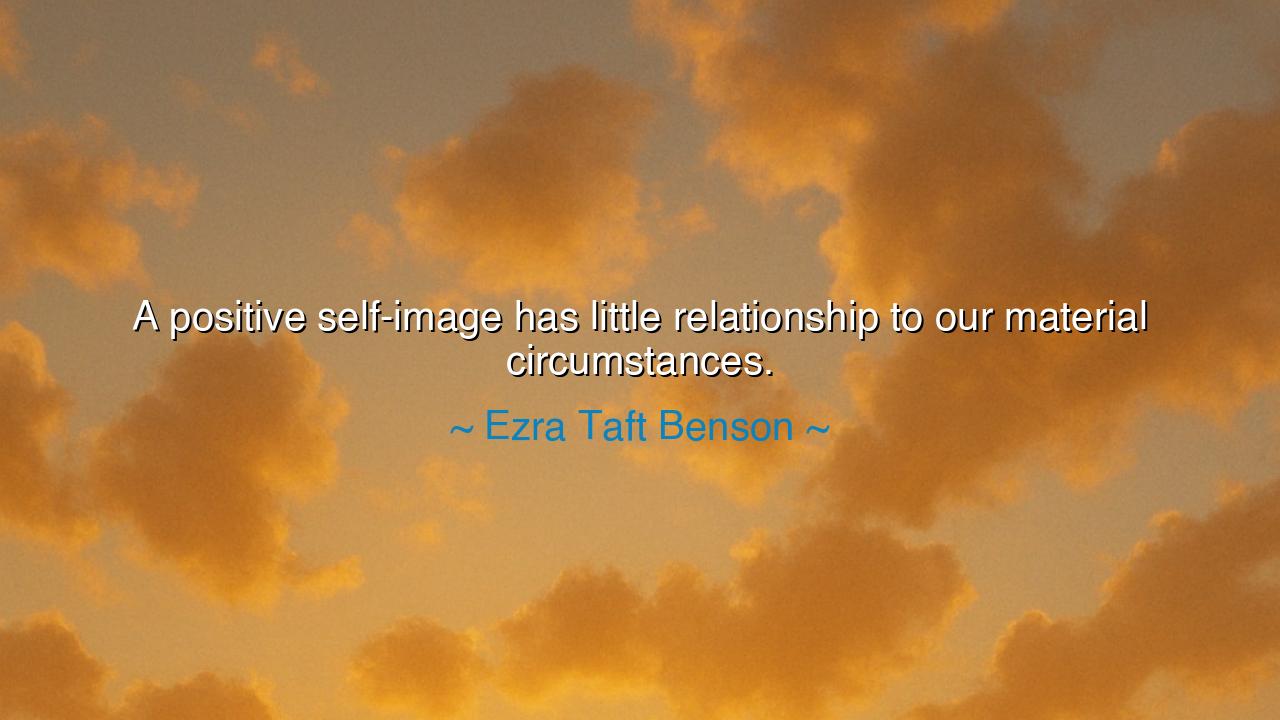
A positive self-image has little relationship to our material






Hear the words of Ezra Taft Benson, spoken with clarity and conviction: “A positive self-image has little relationship to our material circumstances.” In this simple sentence lies a truth that has outlived empires and will outlast kingdoms. For he reminds us that dignity, confidence, and worth are not the offspring of wealth, nor are they chained to outward possessions. True strength of the soul is not measured in gold or garments, but in the quiet assurance of knowing who you are, regardless of what you own.
To carry a positive self-image is to walk with head lifted, even when pockets are empty. It is to recognize that one’s value rests not upon the approval of men nor the accumulation of treasures, but upon the eternal flame of character. Many have thought that prosperity would bring peace of mind, yet countless wealthy souls have drowned in despair, while those of humble means have lived with radiant joy. Benson teaches us that the mirror of self-worth reflects the spirit, not the purse.
History offers us shining examples. Consider Mahatma Gandhi, who clothed himself in the simplest garb, living in austerity while leading millions to freedom. His hut held little, his body owned almost nothing, yet his self-image was unshaken, rooted in truth and in his identity as a servant of justice. His confidence was not forged by material wealth but by inner conviction, and because of this, his influence spread across nations and generations.
So too, remember Abraham Lincoln, born in a log cabin, surrounded by poverty, and educated with but a handful of books. By worldly standards, he had nothing to boast of in his youth. Yet he cultivated within himself a positive self-image, seeing his mind and character as treasures greater than coin. From these humble beginnings, he rose to the highest office of his land, not because of riches, but because he believed in his own worth and purpose.
The meaning of Benson’s words is thus: material circumstances may shape the stage upon which we live, but they do not determine the greatness of the performance. A king dressed in silk may feel small within, while a peasant in rags may stand tall with unshakable dignity. Self-image is an inner fortress, built not by fortune but by faith, discipline, and the recognition that all human beings are endowed with value beyond measure.
The lesson for us is clear: do not tie your self-worth to fleeting possessions or circumstances, for they change as quickly as the wind. Instead, root your confidence in what endures—your integrity, your kindness, your courage, your faith. These cannot be stolen by thieves, nor eroded by poverty. A positive self-image is a crown that sits upon the head of anyone who dares to see themselves as more than what they own.
Practical wisdom calls us to three acts. First, cultivate gratitude daily, for it teaches you to see abundance even in simplicity. Second, measure your worth by your character, not by your possessions; ask yourself each night not “What did I gain?” but “Who did I become?” Third, lift the eyes of others, especially those burdened by lack, reminding them that their spirit is greater than their circumstance. In doing so, you build a world where dignity is honored above wealth.
So let it be remembered: a positive self-image springs not from material riches but from the recognition of eternal worth. Ezra Taft Benson’s words are a call to all generations: seek not your value in gold, but in the treasures of the heart. Live with the assurance that your worth cannot be diminished by poverty nor enlarged by riches, for it rests upon the unshakable truth that every soul is sacred, and every life has meaning beyond measure.






NHNguyen Thi Ngoc Han
I find this quote comforting because it separates self-worth from wealth. It implies that dignity and self-respect belong to everyone, regardless of what they own. However, I also think material conditions can indirectly affect one’s mindset — financial stress can wear down confidence over time. So maybe the challenge is learning to preserve a healthy self-image even when circumstances aren’t ideal.
NNnhi nguyenthiphuong
This statement feels deeply spiritual, as if it’s reminding us that our sense of self shouldn’t depend on the transient nature of material things. I think that’s liberating, but also a tough standard to live up to. How do you cultivate that mindset in a world driven by consumerism and comparison? It seems like it takes deliberate effort to build inner confidence that’s not shaped by material success.
RHRyeong Huong
I really like the timeless quality of this statement. It feels like a quiet truth — that our inner image of ourselves matters more than our external circumstances. But it raises a question: if self-image is independent of material wealth, why do so many people still feel inadequate when they lack it? Maybe it’s not about possessions but about how deeply we internalize external judgments.
TTThanh Thien
This idea strikes me as both empowering and difficult to live by. It suggests that true self-worth is spiritual or emotional, independent of wealth or possessions. Yet society constantly measures people by their achievements or assets. How do we teach future generations to value inner strength and character over material success when so many cultural messages promote the opposite?
TTNguyen Thu Trang
I appreciate the wisdom in this thought — it’s a good reminder that happiness and confidence aren’t necessarily tied to material comfort. Still, I can’t help but wonder if it’s easier to maintain a positive self-image when your basic needs are met. Can someone struggling with poverty or instability genuinely feel good about themselves, or is this ideal more attainable for the privileged?